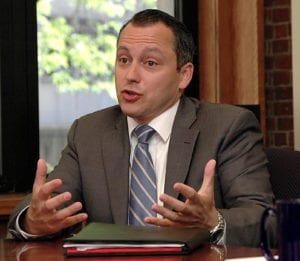Who is a member?
Our members are the local governments of Massachusetts and their elected and appointed leadership.

Rep. Aaron Michlewitz meets with the MMA last year to discuss legislation to regulate and tax short-term rentals, primarily those booked through online services such as Airbnb. Rep. Michlewitz and Sen. Michael Rodrigues led negotiations that resulted in a legislative agreement on the bill.
On Dec. 31, Gov. Charlie Baker signed into law a compromise bill to tax and regulate short-term rentals that do not currently fall under the state’s room occupancy law or other related statutes.
The new law (Chapter 337 of the Acts of 2018) extends the existing room occupancy excise under Chapter 64G – the state law that applies to hotels, bed and breakfast establishments and similar rentals – to include newly defined short-term rentals that are not currently taxed, mainly rentals made through online services such as Airbnb.
The law exempts units rented for 14 days or fewer in a year, and limits information listed in the public registry.
The new types of short-term rentals are subject to the state’s 5.7 percent room occupancy excise and a local-option excise of up to 6 percent. The state and local excise provisions will take effect on July 1, 2019. The local excise automatically applies in cities and towns that have already accepted the existing local room occupancy option.
The new law allows cities and towns, by vote of town meeting or city or town council, to impose a community impact fee on “professionally managed” rentals and certain multifamily units.
The law imposes an additional 2.75 percent room occupancy excise in towns on Cape Cod and the islands to help pay for water pollution abatement projects in the region.
It also grants authority to cities and towns to regulate short-term rental operators through local ordinances and bylaws.
• Mass Dept. of Revenue – Short-term rental FAQ page
• Short-Term Rental Conference Committee Report Summary